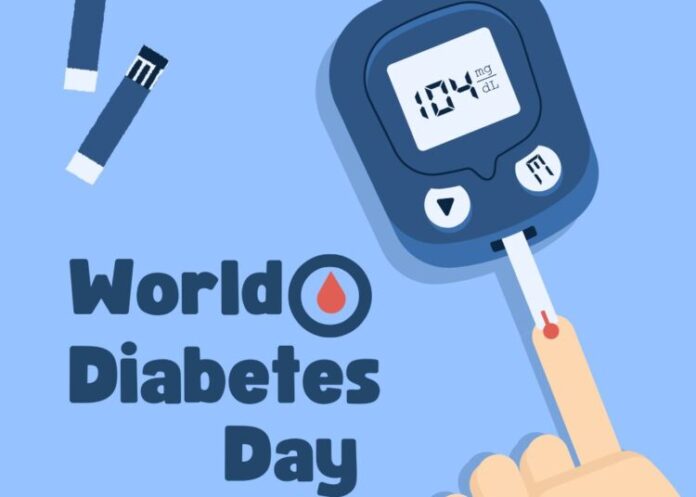As Nigeria joins the global community to mark World Diabetes Day 2025, health experts are drawing attention to the increasing number of people living with diabetes across the country. This year’s theme, “Diabetes Across Life Stages,” highlights how the disease affects people of all ages—from children to older adults—and stresses the importance of early detection, healthy living, and regular medical checks.
World Diabetes Day, marked every year on November 14, is led by the International Diabetes Federation (IDF) to raise awareness about the condition, its causes, and how to prevent long-term complications. With Nigeria recording a steady rise in diabetes cases over the last decade, medical practitioners say the message of this year’s campaign is particularly important.
Available health data shows that millions of Nigerians are at risk of diabetes, especially type 2 diabetes, which is more common among adults but is now increasing among younger people due to lifestyle changes. Doctors say many people living with diabetes in Nigeria do not know they have it, mainly because symptoms may not appear early or are often ignored.
According to public health specialists, factors such as poor diet, physical inactivity, obesity, stress, alcohol consumption, and family history contribute to the rising numbers. In urban centres like Lagos, Abuja, Kano, and Port Harcourt, the rise in fast food consumption, long working hours, and lack of exercise has worsened the situation.
Diabetes is a chronic condition where the body cannot properly regulate blood sugar. If untreated, it can lead to serious health problems such as heart disease, kidney failure, blindness, nerve damage, stroke, and poor wound healing, which can sometimes lead to amputation.
Doctors say early diagnosis and proper management allow people with diabetes to live long and healthy lives. However, late detection remains a major problem in Nigeria, where many people seek help only when complications have already developed.
Though less common in young people, type 1 diabetes, an autoimmune condition, usually starts in childhood. It requires lifelong insulin treatment. Doctors warn that many Nigerian parents are unaware of the symptoms, which include excessive thirst, frequent urination, weight loss, and tiredness. Late diagnosis can lead to a dangerous condition called diabetic ketoacidosis.
With more young Nigerians adopting sedentary lifestyles and unhealthy eating habits, doctors are reporting higher cases of type 2 diabetes among people in their 20s and 30s. Stress, long screen time, and frequent consumption of sugary drinks are contributing factors.
This group has the highest number of diabetes cases. Many adults between 40 and 60 years ignore early warning signs such as tiredness, frequent urination, blurry vision, and slow healing wounds, believing they are caused by stress or ageing.
Elderly people living with diabetes often face complications like poor vision, kidney problems, and difficulty walking. Doctors say regular monitoring and support from family members are important for managing the condition at this stage.
Nigeria faces unique challenges in managing diabetes. Many communities lack access to testing facilities, insulin, and qualified health workers. In some rural areas, patients rely on herbal mixtures, which can worsen the condition. The high cost of drugs, especially insulin, remains a major barrier for low-income families.
Medical professionals say government intervention is needed to make diabetes care more affordable and accessible. They also urge the National Orientation Agency and state ministries of health to increase awareness campaigns in local languages so that more Nigerians understand the risks and signs.
To reduce the rising cases, health experts recommend simple but effective lifestyle changes:
Regular exercise: At least 30 minutes of walking daily.
Healthy eating: Reduce sugary drinks, fast food, white bread, pastries, and fried foods.
Routine checks: People above 40 should test their blood sugar at least twice a year.
Know your family history: Those with diabetic parents must take extra precautions.
Maintain a healthy weight: Even small weight loss can reduce the risk of developing diabetes.
Doctors also warn against self-medication. They say only a qualified medical professional can determine the right treatment.
Health experts encourage Nigerians living with diabetes to stay committed to treatment. This includes taking prescribed medications, monitoring blood sugar, eating balanced meals, and keeping regular hospital appointments. Skipping medication or relying on unverified remedies can lead to dangerous complications.
Support from family members is also important, especially for children and elderly patients. Emotional support, reminders for medication, and assistance with daily tasks can make management easier.
As World Diabetes Day 2025 is marked, health organisations are calling on the federal and state governments to invest more in public health education, screening centres, and affordable treatment. They say the rising number of diabetes cases is a public health emergency that must be addressed urgently.
Non-governmental organisations working in the health sector have also appealed for more awareness campaigns in workplaces, schools, markets, and religious centres. They argue that many Nigerians still have little understanding of the disease and its long-term dangers.
With more Nigerians at risk every year, health specialists warn that diabetes could become one of the country’s biggest health challenges if not tackled early. They say that simple lifestyle changes, early diagnosis, and proper care can save thousands of lives.
As Nigeria marks World Diabetes Day 2025, the message is clear: diabetes can affect anyone at any stage of life, but with awareness and preventive action, many cases can be avoided or properly managed.

